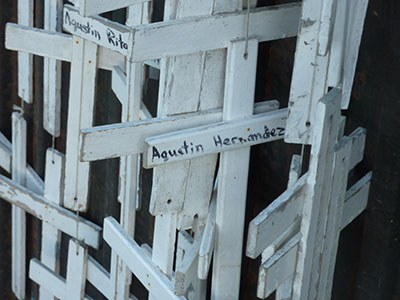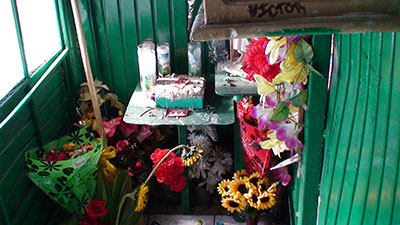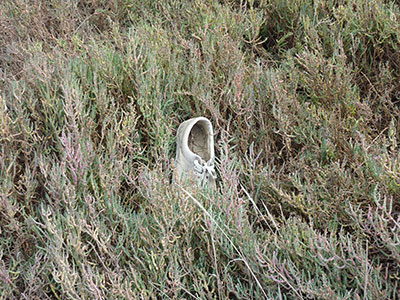In this five-part series, Greg Olear talks with Katie Arnoldi about how U.S. policies on marijuana and immigration are detrimental to our nation’s health. Click here to read from the beginning.
[GO]: In the years preceding the U.S. invasion of Afghanistan, the horrific treatment of women by the Taliban was a big story in the West—and rightly so. Afghanistan under the Taliban was, and remains, a society that considers women inferior to men. I was reading Barnett R. Rubin’s The Fragmentation of Afghanistan recently, and what I didn’t realize is that after the Soviets left and before the Taliban filled the void, the rural parts of that country were essentially anarchic, a free-for-all.
“In Qandahar in particular,” Rubin writes, “internecine fighting led to chronic anarchy, manifested in rape and abduction of women.” Under the Taliban, as astonishing as it is for us in the U.S. to imagine, conditions for women in these more remote areas actually improved. “In the West the Taliban were best known for their repressive policies, especially against women, but they boasted in particular of their policies to restore security,” he writes. “For the Taliban these efforts at restoring order were of a piece with the decrees on women and religious behavior that see bizarre and repressive to many in the West, as well as to many Afghans, especially the urban and educated part of the population.” The rigid laws, the burquas, the prohibitions on travel and education—this was their way of protecting their women.
This is not to defend the Taliban, of course, who are as benighted a group of ideologues as can be found on the planet, but to make a point: we Americans consider ourselves enlightened with respect to feminism and treatment of women, but the fact is, one of the by-products of our archaic immigration policy is the systemic sexual abuse of immigrant women. This happens here, in this country, on U.S. soil, and it happens with shameful regularity.
[KA]: It is incredibly dangerous and expensive for anyone to cross the border illegally. We’ve discussed the impact of the border walls in all the accessible areas and how they now funnel immigrants into the most harsh and dangerous terrain. Hundreds of people have died on U.S. soil of exposure and dehydration since we built all those walls. It’s a difficult trip for everyone but women face an extra and especially brutal challenge.
If you go down to Tijuana or Ensenada and talk to the women in the migrant shelters, you will hear, over and over, that today rape is very often part of the price of admission for illegal entry into the United States. It’s impossible to get an accurate figure but relief organizations estimate that something like 80% of women are sexually molested on their journey north, whether it’s in Mexico or the U.S. or on both sides of the border. This is a commonly known fact in Mexico.
[GO]: And criminally underreported here in the U.S.
[KA]: So a young woman decides to make the trip north. Maybe her boyfriend has a job picking fruit in Texas or Florida and he’s sent for her. Maybe the father of her infant son has disappeared on his journey north and she’s heading out in search of him. Perhaps she’s been abandoned by her husband and has no way to feed her kids so she’s traveling to California where she can earn enough money to provide for her family because there are no job options for her at home. She’ll leave her children with her mother or other relatives with the agreement that she will send back all of her money to support them. She will scrimp and save and borrow until she has enough to pay for her passage and then she’ll head out. Usually there will be an agent in her town or somewhere nearby who will establish the fee and help with travel arrangements but sometimes a woman may just head to one of the border cities and hope for the best.
Every single one of these women who decide to make the journey north will have been warned about the dangers. They’ve heard the stories; they have friends or family members who have been victims of terrible atrocities at the hands of bandits or unscrupulous guides. And these women are fully aware of the violence surrounding the drug wars. Have you ever looked at the Mexican papers? They publish full color pictures of those decapitated bodies hanging from the freeway overpasses right on the front page. There is not one single person alive in Mexico today who has not been touched in someway by the cartel savagery. These women know how dangerous it is to cross into the U.S. and yet they still decide to go.
Mexico is a very religious country, and the Catholic Church is a central part of most people’s lives. Prayer and a firm belief in God as a protector is a crucial source of strength. There are specific travelers’ saints such as St. Judas Tadeo and the very popular St. Toribio Romo who are believed to watch over migrants on their journey. All along the Mexican border you can find roadside shrines to these saints with flowers and burning candles where migrants can stop and pray and ask for protection.
[GO]: They should be protected by something more tangible than saints. If Marco Rubio wants to make a case for immigration reform, this is where he should start. So take us through a woman’s immigration experience.
[KA]: Typically a woman will travel from the countryside by bus to one of the staging areas along the border. When she arrives in town, the first stop she’ll make is to the pharmacy for birth control, usually in the form of a shot but sometimes pills, because she does not want to risk a pregnancy should she be raped. The next stop is the Catholic Church, where she will ask the priest for absolution because the use of birth control is a sin in this very religious country. The priest will absolve her. Maybe he’ll try and change her mind about taking the journey, maybe not. If she hasn’t already done so, she will hire a guide and pay him several thousand dollars to take her to a safe house in Riverside or Tucson or Phoenix or Las Cruces, San Antonio or Houston. Once the agreement is made, the guide will take her to one of the cartel-controlled flophouses where she will wait until it’s her turn to cross.
My close friend, John Carlos Frey, an American filmmaker and journalist who has done a lot of work about migrant issues, went down to Altar, Mexico, in July of 2010 and came across the border with a group of immigrants led by a guide who worked for the Sinaloa cartel. He spent several nights in one of the flophouses and described it as a very basic open warehouse. Along the walls were a series of shelf-like platforms, made of plywood covered in cheap carpet, bracketed to the wall and stacked like bunks. Each shelf was the size of a queen mattress upon which five people were expected to sleep. The person closest to the wall would have to crawl over her four bedmates if she needed to use the single filthy toilet that accommodated the 60-70 people sleeping in the room on any given night. Strangers sleeping cheek-to-cheek with strangers, everyone scared and desperate—most likely this is the first place that our woman would be molested. There is no one to help her if she cries out in the night, no one who will protect her. She’s terrified, but so is everyone else. She doesn’t want to cause any trouble for fear of repercussions, and so if she is unlucky enough to be targeted by a predator in that flophouse, she will most likely allow herself to be molested rather than risk jeopardizing her journey.
During the day she will find the shops of Altar stocked with everything the migrant might need for her journey, dark clothing, sturdy shoes, small backpacks, black plastic gallon water jugs, sunglasses, food. There are stalls selling t-shirts and hats with the image of St. Toribio and other religious paraphernalia targeted towards safe travel. And all of these things are sold at hugely inflated prices. The guide will tell her exactly what she is and is not allowed to carry on the trip. He will demand she wear clothing that will blend with the landscape, no bright colors allowed. Our girl probably doesn’t have much money left and will make due with the bare necessities.
Finally, after a night or two in the flophouse, the guide will come and tell her it’s time to go. A van will drive her, and the other immigrants in her group, thirty miles north from Altar to a ranch that sits on the actual border. The rancher will have set up a stall that sells last minute water bottles, hats, jackets, etc. at even more inflated prices. She and her fellow travelers will probably bed down in the dirt with the cow patties and wait until just before dawn to begin their walk. Hopefully she will have sturdy shoes, but she’s poor and she’s spent all her money for the guide so it’s likely that she’ll be wearing cheap tennis shoes instead of hiking boots for her two-, three- or even four-day walk through the deserts and mountains.
There are guides and spotters working on both sides of the border. They monitor border patrol movement and are in constant radio contact with each other, mapping out routes and escape options. The group has to move quickly. If someone is sick or unable to keep up, they will be left behind. Each person has to carry her own water; temperatures in the desert often reach 120 degrees. It’s every man for himself.
There are stories about coyotes taking the underwear from their rape victims and hanging them in the trees as a sort of trophy. Whoever gets the most panties wins. They call these trophy displays “Rape Trees.” If a woman is raped on the course of her journey, she’d better hope she isn’t hurt too badly because she needs to keep up with her group. If she’s too slow, she will be left behind.
[GO]: Rape trees. In the United States. Jesus Christ.
[KA]: After one or two or three or even four days of walking through the wilderness, if all goes well, the group will make it to the pick-up spot which will be on some dirt road where a car or van will be waiting. The group will be forced to leave all of their belongings because they will be crammed inside the vehicle like sardines and there won’t be room for anything extra. You will find these dumpsites all over California, Arizona, and Texas. Empty water bottles, piles of clothing, cherished personal effects, photographs, bibles, letters from home, important documents, all the things that were important enough to lug across the blistering desert have to be surrendered in order to continue the trip north.
The group will be driven on remote back roads to a safe house somewhere in the suburbs of Phoenix or Tucson or some other city. In theory they will be fed, allowed to shower, offered clean clothes and then transported to their final destination. But increasingly you hear stories of immigrants being held hostage, their relatives extorted for more money while the captives are tortured and abused. If the money is paid, our woman may finally make it to Oregon or Washington or North Carolina where a friend or family member has promised to help her find work. But by the time she arrives, she will have paid dearly.
[GO]: And just as the undocumented migrant workers have no legal recourse when they are exploited—because they are here illegally, they cannot take advantage of our worker protections, even though they are a net positive on the economy—these women are in no position to go to the police for help.
[KA]: That’s right. It’s dangerous for everyone, but the women are incredibly vulnerable both here and in Mexico. There is literally nowhere to turn for help or protection or justice.
In Part V, we offer solutions.






